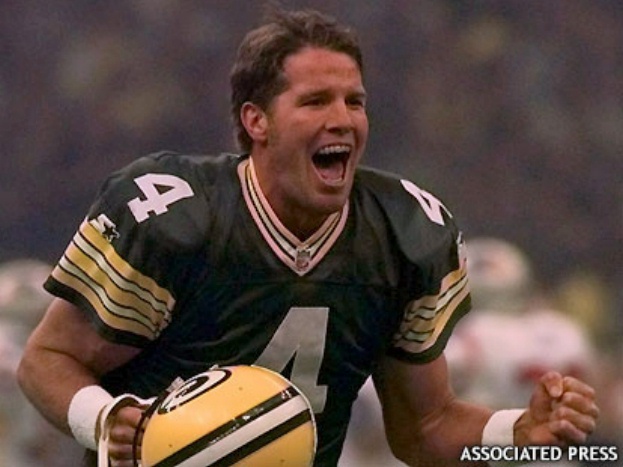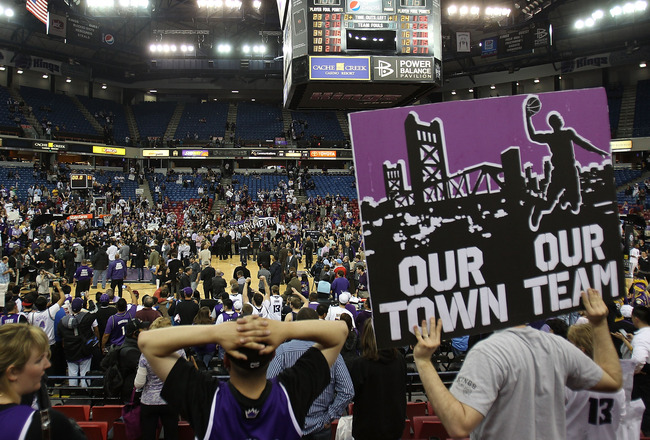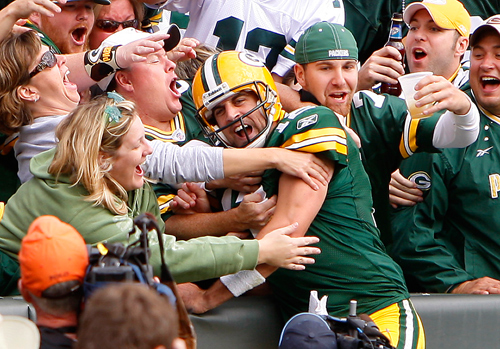Editor's Note: In this edition of the Sunday Discussion, we probe the mind of famous non-economist Adam Smith. Though Adam, as a native Wisconsinite, is more of a fan of professional football than basketball, his academic research and professional work in urban planning and development enable him to discuss the arena deal that will keep the struggling Kings in California's capitol city. Adam is a project coordinator at an environmental and planning consulting firm, and lives with his fiance in Sacramento. We hope you enjoy his perspectives on one-sport cities, the importance of quality ownership, and the lessons the city of Sacramento, and the Kings could learn from a city like Green Bay and their Packers. Let's get to it.
*****
You know, I haven't had too much experience with the NBA. I don't know, I'd watch Bucks games every so often while growing up. I don't know if it was just that the team was never really doing anything that spectacular, but I was growing up in the golden era of Brett Favre, and the Super Bowl championships in 1996 and 1997.
So football was dominating.
Yeah. And it's still that way. So yeah, I haven't been too much of an NBA fan, despite a few efforts to get into it.
Sure. I mean, you've had some decent Bucks teams. In 2001, I think, that Bucks team got a game away from the NBA finals. But was it just that the Packers were good, or that Wisconsin is more of a football state, with both the Packers and the Badgers?
You know, I think it is more that Wisconsin is a football state. Certainly in Milwaukee there are die-hard Bucks fans but in terms of the state more generally...it may be the tradition the Packers have there, or demographics, or the average quality of the Bucks teams over the year.
Right.
I remember there being a lot of excitement around the "Big Three" of Glenn "Big Dog" Robinson, Ray Allen and Sam Cassell. I know they made the playoffs a few times. I don't remember being particularly enthralled.
So would you say professional basketball is firmly in third place behind the Pack and the Brewers?
I that's fair to say. The Brewers have a surprising following. And I have never really been a huge baseball fan. They're pretty popular.
Well, they're good now. And I feel they were always more popular than the Bucks, even when they were a bad team.
I would say they were relevant in the early and mid eighties with Robin Yount and stuff. And then, well, not for the lion share of my lifetime.
Well now you live in Sacramento, an interesting sports town which was in danger of losing the Kings until very recently. Did you sense a tangible feeling of anxiety in the city about losing the team? Where did that stand until pretty recently?
You know, it's interesting, because there's definitely a sizable proportion of people in the city who are Kings fans, and who wanted them very badly to stay, and were very vocal about trying to get them to stay. But there's as big a group of people, or maybe bigger that are tired of the Maloofs and their antics. And it's almost a separate issue. Regardless of their feelings on the Kings, or their feelings on professional sports, they didn't want the city to give the Maloofs one red cent to keep them there. So, it's interesting, because I think if the ownership issues were absent, there would probably be much more consensus and much greater acceptance of the team, and much more support for any sort of public contribution to a new arena. So it's kind of a complicated situation.
Absolutely. So, you talked about a lot of different things there. You talked about the civic importance of the arena, or lack thereof, and the Maloof ownership and their own financial troubles, and their status as wealthy benefactors to the city, but also individuals who have benefitted from the city, so let's parse that down a little bit.
Okay.
Let's talk about the arena. So you studied urban planning in graduate school (at the University of Wisconsin in Madison). Do you work in urban planning now?
I do. It's...related. Yeah. Related.
Nice! You got the job related to grad school.
[Laughs] Yeah.
If we could all be so lucky. So in any case, you studied urban planning, and work in it. So in your view, does the arena that's going to be built in downtown Sacramento seem like a good fit for the city?
You know, I think in terms of separating it from everything else I think it would be good to have an arena. So, where they're looking to put the thing is this area called "the Railyards," and its basically this huge area of redevelopment that for years used to be owned and used by the Union Pacific railway. And it's a massive area; it's really sort of unprecedented in a major American city's downtown to have such a large area be vacant and developable, and so close to the central business district. So it holds unique opportunity from an urban development standpoint. And to the extent that an arena could act as a sort of anchor for redeveloping that area, I think it could be beneficial, and certainly from an urban planning theory and standpoint, it's far preferable to have an arena in a denser downtown area, than an arena like Arco, which is a ways away from the downtown area.
Arco is located, what, 25 miles away?
Not that far, but it's an appreciable distance from downtown Sacramento. Now, you'll have some people who say that, well, an arena, and in particular, with football stadiums, because they're larger, and they only host like ten events per year, you'll have people say that that's not a great use of urban space, because you're taking up all this room for something that's only used like ten times a year. It's different with a basketball arena since it's not taking up as much room, and there's more days that it'll be hosting events, and it can also do stuff like concerts and other things aren't sports-related. And, as nice as it is to have the Railyards, and the potential for a lot of development in the downtown area of Sacramento, you need not just good planning, you need a market. And the Sacramento region is one of the hardest hit metropolitan areas from the housing downturn. It's still floundering in those terms. I wouldn't say it's a strong development market.
Right.
If the arena can change that, that's fine, but I think the biggest point is that people should really be upset that they're going to build an arena on this land, when instead, there could be 40-story apartment buildings or condos. I don't see that type of development getting financing, or being successful in Sacramento right now. So any sort of development they can get is a good thing.
Well the biggest "plus" in terms of the arena, and this is related to financing, is that no public funds are being used. The Maloofs are putting up a huge up-front share ($70 million) and the city is leasing out parking garages to existing businesses and corporations in the area, which over time will raise $250 million of revenue to pay off the rest of the arena. That has to be a good thing, right? This sounds like something that will provide development opportunities for that downtown area at no cost to the taxpayers.
Yeah...I'd say that's mostly true. I think what that overlooks is that the revenue that city will gain, and could gain, by leasing out operations of the parking structures is in fact at least potentially public revenue, even if it's not public revenue right now. So in the sense that its not coming out of the existing general fund for the city, that's true, they're not using the city's money. But the city is making arrangements to increase their revenue, and they're choosing to spend it on an arena, and I think...well, let's put it this way: there are other needs. There are many other needs in Sacramento when it comes to funding public programs.
Well, that's a great segway to our next question: what does this arena say about the priorities of the city of Sacramento? I mean, Mayor KJ (Kevin Johnson), former NBA player, worked tirelessly to get this arena deal done, and his efforts paid off. But could he have spent his energy on different things besides keeping a money-losing operation like the Kings in town, or bailing out the Maloofs, or really, showing the city's hand when it comes to generating revenue? Especially when all that revenue is going to go to paying this new arena off?
Yeah. That's a great question. I don't know if there's an easy answer. It's certainly true that there are other priorities. The city had to layoff police officers last fall, and since then, have hired them back, but it certainly indicates that there are other needs. That said, something like leasing out parking operations with the understanding that parking fees will go up once they're operated by a private firm is not something that normal Sacramento residents, or city council members would support if it wasn't being earmarked for something that was somewhat flashy or sexy. I'm not sure you would have the support to do that if the cause was for, say, not closing down a school to save money. I don't know. Maybe you could.
Well, let's present a hypothetical. Say this arena deal had failed, yet, more time was bought by KJ to put forth a last-ditch referendum, that would propose that taxpayers commit public dollars to fund a new arena. Would that referendum pass?
That's a really good question. I don't think it would. At least, not if it was phrased that way. I don't think it would pass if people thought about it in terms of tax money, or in terms of dollars that could go towards something else, or fewer dollars that they'd have to pay in terms of taxes. The fact that the arena is being sold as a sort of, "well, it's not really a use of public money, it's not really a tax increase. We're just privatizing parking operations." Yeah, on the face, most of that's true, but again, the most important question folks would want to ask themselves, and if it was voiced in a referendum, it probably wouldn't be supported, but they want to ask: "should we use this extra $250 million to help a private entity build an arena with no guarantee that they'll be here in five or ten years, or should we do things like pay off other lease agreements?"
There is a twenty-five year lease agreement, so at a minimum, the Kings will be around until 2037.
Whether we want them or not [laughs].
So what is the narrative of this story? Is this an emotional victory for the fans, whose outpouring of grief over the team's potential move to Anaheim became a major symbol? Or is it a story of civic maneuvering at the city government level, where well connected people like Kevin Johnson, who already has a close relationship with David Stern, and guys like the Maloofs, who were kind of the golden sons in terms of NBA ownership, even though by all accounts, they've been financial fuckups for awhile?
[Laughs] Well, I think the overarching narrative that I see coming from this is that something is going right for the city, that something is going right for Sacramento, which regardless of my feelings on the issue, or the related issues, there's kind of this symbolic importance for the city to say, you know, "yes, lots of things have not gone right over the last four or five years, but..."
"But, goddammit, we're not going to lose our team."
Exactly. "We're staying on the map." At least, in terms of hosting a professional sports team. And I think that has symbolic importance for a team that is sort of unsure of what it is, or what it wants to be, and is on uncertain economic footing. So all things considered, it's a shot in the arm, if only kind of a symbolic one.
Well, another city that has just one professional team that has huge symbolic importance not just for the sport, but for the city and the people in the city is the Green Bay Packers.
Absolutely.
So what can a city like Sacramento, which has just one team that is losing both games and money, learn from Green Bay, whose team not only wins, and wins big, but also is valuable. It's worth $1.01 billion, according to Forbes.
Well, yeah. It's tough because it's like comparing apples to small toy boats, in some ways. It's not even another fruit. It's a completely different thing.
[Laughs] Right.
I mean, I guess it starts with ownership, which isn't anything that you can learn. Whereas in this case, there's a contentious relationship between owners and the city, and fans, in Green Bay's case, the ownership is the city, is the fans, in a lot of ways. So issues of profit, and issues of who's going to pay for facility upgrades, are always going to be second in priority to the success of the team itself, and what the team is going to stand for.
Right.
So that makes a huge difference. I'd say the other thing [that Sacramento could learn] would I guess be about the team, and the team's relationship to the city's identity. In the Packer's case, no one on a national level, would associate Green Bay to anything besides the Packers. But Sacramento, for a lot of people at least, is the capital of California, and for good reason. That's its most consistently important contribution to national discourse.
Agreed. Especially as a born-and-raised Californian.
So to the extent that the Kings can embody, in the way that they're managed, and the way that they play, the spirit of the city, and the identity of the city, I think the more fans they'll gain, and arguably, the more successful they'll be.
That's an awesome way to put it. Well, last question: do you watch the Kings now? Will you? Maybe even go to a few games?
Well, I would've gone to Kings games before, but haven't gotten around to it. I would certainly be interested to see a game at Power Balance Pavilion, so a few years down the road, we could compare it to the new place. But there are never games on network TV. And I didn't have cable growing up, but a local channel would have Bucks games on. And here, unless you have cable, or listen to the radio, you aren't going to see games. There, at least you'd get some sort of exposure to the team.
Same thing in the Bay growing up with the Warriors. First it was on KOFY 20 (later the WB), but then went to Fox Sports Net, or whatever, in 1999 or 2000.
Right, and before all of this, I probably would've watched more, if I could.
Right. It's more than a question of the market, it's about the way we consume games in general. It's a much more specific, wealthy audience.
Sure. It's an access issue, just like anything else. I don't know if it's a league-wide thing. And for those who never grew up in houses that were big into the NBA, they lost the opportunity for people to be flipping channels, say, "oh, there's nothing else on, I'll just watch 'Local NBA Team X'", and someday become a big fan.
Yeah. True. Adam, thanks. That was fun.
Yeah, sure, anytime.
















No comments:
Post a Comment